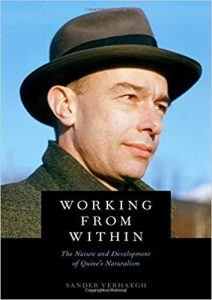 Richard Marshall interviews Sander Verhaegh in 3:AM Magazine:
Richard Marshall interviews Sander Verhaegh in 3:AM Magazine:
Quine has always identified himself as a member of an international movement of empiricist philosophers. In 1932, just after he obtained his Ph.D., Quine spent a year in Europe to learn from what he regarded to be the leading ‘scientific philosophers’: Schlick’s circle in Vienna, Carnap in Prague, and the Polish logicians in Warsaw. Later, he helped many of these philosophers to get a position in the US, and played a role in the Unity of Science Movement. Many of these ‘scientific philosophers’ dismissed the traditional philosophers’ foundationalist projects and sought to reconceive philosophy as a scientific enterprise. Carnap, for instance, argued that philosophy should become a “properly scientific field, where all work is done according to strict scientific methods and not by means of ‘higher’ or ‘deeper’ insights”. Philosophers, Carnap believed, should study the logic ofscience.
Some of the documents I found in the archives show that Quine’s first meetings with Carnap had a tremendous impact on his metaphilosophical development. In a report to the people who funded his fellowship, for example, Quine writes that Carnap helped him to find “the most satisfactory answer” to the “perplexing question of the nature of philosophy”. Because much of the historiography of twentieth-century analytic philosophy is focused on the Carnap-Quine debate, people tend to forget that the two basically shared the same perspective on philosophy. I believe it is historically more accurate to claim that Carnap and Quine, in their discussions about analyticity, ontology, and the nature of logic and mathematics, were only disagreeing about the details. As Gary Ebbs has recently argued, Quine was just trying to be “more Carnapian than Carnap”; he was trying to improve the empiricist tradition from within.
More here.
